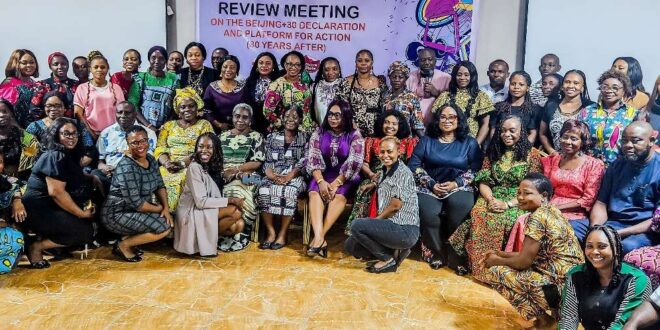By Kelechi Nwaucha
30 years after the Beijing Declaration, women in the South South of Nigeria have gathered in Port Harcourt, the Rivers State capital, to review the progress so far made in achieving “true gender equality and women inclusion” in the region.
The meeting, which kicked off on Monday, hosted by eco-feminist organisation, Kebetkache Women Development and Resource Centre, brought together women from the six states of the South-South geo-political zone, government officials, civil society groups and the media.
The Beijing Declaration and Platform for Action, adopted at the Fourth World Conference on Women in Beijing, China, in September 1995, analysts say, remains a landmark document for gender equality and women’s rights.
The declaration outlines 12 critical areas of focus, which include poverty, education, health, violence, armed conflict, economy, power and decision-making, institutional mechanisms, human rights, media, environment, and the girl child.
Meeting for two days in Port Harcourt, the participants agreed that though significant progress had been made in advancing women’s rights and inclusion in the region, challenges still exist, requiring persistent efforts towards achieving true gender equality
Executive director of the host organization, Kebetkache Women Development and Resource Centre, Dr Emem Okon, said much still needs to be done by all stakeholders and the society at large.
She noted that the meeting, tagged ‘Review Meeting on the Beijing +30 Declaration and Platform for Action (30 Years After),’ essentially sought to assess the level of implementation of the Platform for Action. “What we intend to achieve is to measure what has been the progress when it comes to issues of advancement of women. After the meeting of 30 years ago, these expectations for women, have the society met it, even 50%?”
Dr Okon said “on the surface, there have been some levels of improvement, we have a few women here and there (in positions of authority),” but queried how much influence or access to power such women have.
“Because we are assessing the implementation within the six states in the South-South geopolitical zone, we will see what has been done, what has been achieved, and the challenges we still experience.
“I can say for one, in Rivers State currently, we have a female deputy governor. Even at the local government level, we have a male chairman, and then female vice-chairman. But then, there are also some other issues we will look at, apart from just having the presence of a woman. How much power does she have to effect changes? How much influence does she have? At the community level, some community development committees are beginning to include women in their committees. Are those women making a difference or are they just there?
“At the House of Assembly, I know there was a time in Rivers State we had up to three or more out of 31 members. But now, even at the national level, the number of women in the Senate has reduced from what we had previously. We have about 4% in the House of Reps. These are the areas we are looking at, and then we will also come up with recommendations,” she said.
In an ‘Overview of the Beijing Conference,’ Professor Roibito Ekpiken-Ekanem, Executive Director and Founder of Women in Action for Positive Development and Gender Enhancement Center (WAPDAGEC), analyzed the trajectory of the pursuit for gender equality and women’s rights, from the Beijing Conference of 1995 till date, while drawing her analysis down to the situation in the Niger Delta and Nigeria as a whole.
Professor Ekpiken-Ekanem, who is also a lecturer at the University of Cross River State, UniCross, said “The Beijing Conference was very interesting because for the first time, it afforded women a platform that they could utilize as an instrument to carry out activities of awareness in 12 critical areas covering poverty, health, education, environment, and the rest of them.
“One of the greatest activities that came out was that this Platform for Action, which is the instrument we are talking about, that was adopted, made women to understand that they have a right to come back home and participate in awareness creation and other activities, working side by side with men. It wasn’t equality as in come and overcome. It was explicit, because the emphasis was on equity.
“This instrument has, for the past 30 years, given an opportunity for the world, Africa, Nigeria, and of course the South-South zone, the geopolitical zone of Nigeria, our Niger Delta, to sit down, ask women what they need in terms of armed conflicts. Women are now bold enough to talk to their own children, to talk to their fellow women, to talk to community members. It has also given women an opportunity to break norms.
“In all of it, the Beijing conference had afforded women an opportunity to uplift the status of poverty, to make sure healthcare has gone to the rural facilities, to make sure every need in terms of environment, in terms of armed conflict and there is so much achievement.
“Apart from that, you have women have broken loose out of the traditional subject areas and occupational areas. Women now go to any sphere. They are senators, they are deputy governors. We are still striving. We are going to become governors. And we’re going to be even president of Nigeria because of these instruments,” Professor Ekpiken-Ekanem said.
Delivering a male assessment of the status of women in the Niger Delta thirty years after the Beijing Declaration, Comrade Henry Eferegbo, Executive Director of OLEGH Centre for Community Development, said “The declaration is promise to free women from discrimination, exclusion and violence. They also made a promise not to leave any woman behind. In the Niger Delta today, are women left behind? Yes, several women are left behind.
“Are women still going on discriminated? Yes, several women are going through discrimination. Are women passing through violence of all kinds, marital violence, child abuse, sex, rape, and the likes; even abuse in the office, abuse in the house. Yes, several women are passing through such abuses. Are women excluded? Yes, women are excluded from decision making in various communities, even in governments.”
Eferegbo said though awareness of women’s rights is growing the region, with women, groups, security agencies and even the men realizing the need to campaign for women’s freedom, the implementation of the Beijing Declaration is still very poor after 30 years
“So I rate it at 20-30% of the performance in the Niger Delta. Until we have a majority of women getting free, we will not have a sustainable community and environment,” he said, while calling on the women to get organized and begin to demand for the protection of their rights, and for awareness creation among security agents on the rights of women.
In goodwill messages, Dr. Itoro Etim, member of the Akwa Ibom State House of Assembly; Nkemedirim E. Odoya, Director, Forestry, Rivers State Ministry of Agriculture and Nimi Elele, Desk Officer, Climate Change, Rivers State Ministry of Environment, urged women to own the pursuit for the protection of their rights and inclusion in the social space.
Dr. Etim added that if the woman “is good enough to be a mother, wife, school teacher or a nurse, then she should be good enough to be a policymaker, she should be good enough to be in the House of Assembly, good enough to even be a state governor. It is time for women to talk women, for women to talk politics and for women to talk governance.”
 PH Mundial – Port Harcourt Online Newspaper News Across The Region
PH Mundial – Port Harcourt Online Newspaper News Across The Region





